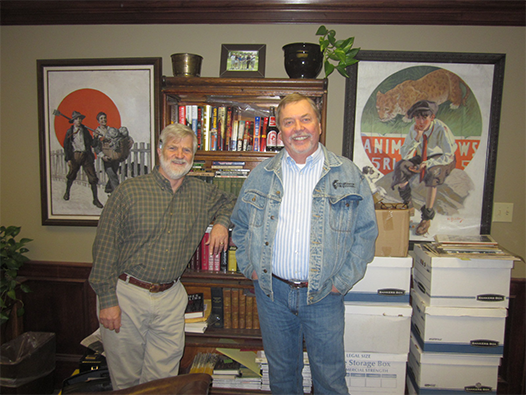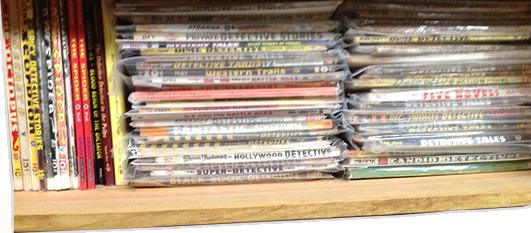
- John McMahan (left) and John Wooley (right), the owners of Reverse Karma Press. |

|
|
If you're a lover of escapist literature, of stories that take you out of yourself and into strange and exciting places, then you're living in a great era. Although the original heyday of the pulp magazines (and if you don't know what those are, please read our introduction to the pulps, just below) came between the two great wars, vast upheavals in publishing technology have led to nothing less that a pulp renaissance, with publishers – and webmasters –– large and small reprinting stories from the pulp mags' golden age. Some publishers, albeit with mixed results, are even creating books full of new stories featuring the old pulp stars.
In the midst of all of this, Reverse Karma Press offers a unique take on pulp literature that blends the very best of the classics with a dollop or two of the brand-new. Its principals, John McMahan and John Wooley, have spent a combined nine or so decades not only reading and digging pulps, but also passing that singular, beautiful experience on to others. McMahan, the force behind the eBay powerhouse My Back Pages, has for many years been a respected and well-traveled pulp dealer, while Wooley is an award-winning writer whose credits include the made-for-TV movie Dan Turner, Hollywood Detective, his homage to one of the great classic pulp characters. With Reverse Karma Press, both Johns pledge to give both seasoned and new readers the best escapist fiction anywhere, combining the highest-quality and most intriguing stories of the past with new and engaging material rooted firmly in the fertile soil of the pulp magazines. Indeed, it's pulp with a twist. So step up and take a sip or two. We guarantee you'll enjoy it! |

|

- a glimpse of John Wooley's pulp collection |
|
While some of you who find yourself on this site are, like us, major fans of the old pulp magazines, we realize others aren't. Even though the term "pulp fiction" has become ingrained in our popular culture, we figure most of America doesn't really know what a pulp is – or was.
So here's a quick rundown: Pulp magazines were popular all-fiction publications, with rough-paper interiors and slick lurid covers, whose sole purpose was to entertain the masses, Although they first came along well before the '20s, and didn't really die out until the '50s, their years of greatest success began after World War I and continued just past the end of World War II. During that time, hundreds of different pulps – so named because of the low-grade wood-pulp pages used in the magazines – blossomed like exotic flowers on newsstands and drugstore magazine racks across the country, promising nothing but thrills to the potential reader with a dime or fifteen cents, the price of admission, in his or her pocket. While there were popular general-interest adventure pulps like Argosy and Blue Book, most pulps dealt with specific genres. Besides detective and mystery fiction, other categories included western, sports, romance, horror, air war, and hero, super- or otherwise. Some, like Ranch Romances, blended genres; others, including the short-running Zeppelin Stories, whittled its subject matter down to a nub. They were all alike, however, in that they presented unapologetically escapist fiction, offering readers nothing more than a few hours of respite from the stresses of home and work and life in general. The great thing is this: they still work. Pulp stories remain a gateway to a thousand thrills, a ticket to the sweetest kind of escapism, and Reverse Karma Press is committed to making sure that we deliver our share. |


